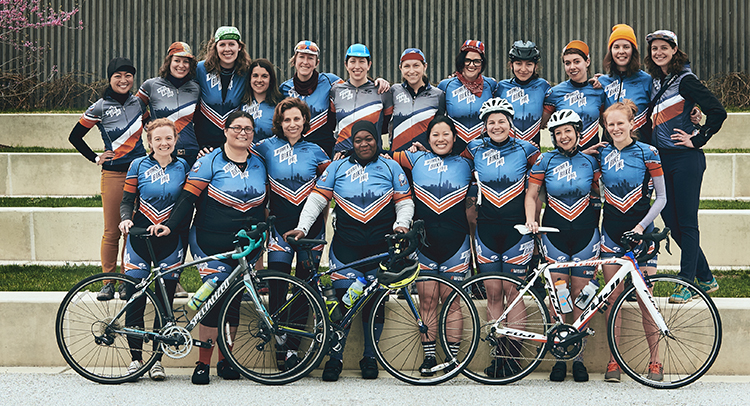Photo by Mark Likosky
A Bike of One’s Own
by Justin Klugh
One journey started on a pair of bike tires, cruising over the flatlands of Lincoln, Nebraska.
“On a dare, I got into bike racing in the fall of 2009,” says Nebraska native Elisabeth Reinkordt. It was cyclist Sidney Brown, a National Time Trial champion of her age bracket at the time, who issued the challenge. She dared Reinkordt, who was attending a bike race as a spectator, to come back the next day as a competitor. By doing so, she set Reinkordt off on a course that she continues today.
Around the same time, a second journey began in the bike haven of Stanford University.
“I was not a serious athlete in college,” Michelle Lee says. “I played Ultimate Frisbee. But at Stanford, 97 percent of the students use bikes to get around.” Becoming a commuter cyclist evolved into planning a bike trip from Seattle to San Francisco, furthering Lee’s passion until she found herself competing in 26 races in a single summer.
Both journeys culminated at the starting line of Philadelphia’s Navy Yard Criterium on April 15, a women’s bike race attended by Reinkordt, Lee and the two women’s cycling teams they’ve assembled: Reinkordt’s Team Laser Cats and Lee’s Team Mathletes. Under the umbrella of the Bicycle Coalition of Greater Philadelphia, Reinkordt and Lee, both 34, have partnered to spearhead Women Bike PHL Development (DEVO), the racing arm of Women Bike PHL, an innovative cycling development group. Their long-term goal: Help bolster Philadelphia’s cycling culture for women in yet another male-dominated sport.
Like any program, culture or society, cycling in Philadelphia has barriers that make things more difficult for women simply because they’re women. Reinkordt describes the atmospheres in some corners of the sport as “less than welcoming.”
“Depending on where you are, there can be a culture in cycling that’s sort of ‘tough enough,’ ‘hard enough,’ you know,” she says. “You go out on a hard ride and people just sort of launch attacks and people get dropped from the ride, and maybe you find yourself out in the countryside and you have no idea where you are. That can be a pretty brutal introduction to the sport.”
But the more inclusive the road that Reinkordt and Lee are forging, the more it’s well-traveled.
Former high school and college athletes have joined them, yearning for the challenge of (another) uphill battle, as have commuters wanting to channel the rush of a Monday morning bike lane into a more competitive atmosphere. And some women come to them who just want to prove something to themselves, or want an affordable method of transportation that prevents them from having to walk in areas where they feel unsafe.
“For a lot of women in the city, having safe infrastructure to get around particularly, that’s a barrier. ‘Am I even safe to get from my house to my job? Or my house to my child’s school?’” Reinkordt explains.
Even as large as it gets, Reinkordt and Lee describe a community that has become a family, sharing frustrations and challenging each other to keep up.
“It’s a gathering place for women cyclists of all different interests,” Lee says.
Women Bike PHL and its DEVO subdivision house an online community for women to communicate, and Lee has started running skills clinics for beginners, thanks to a grant received by the Bicycle Coalition. Meetups, classes and social events on riding and mechanics vary from open to the public to exclusively for women. The group has even established a Girl Scout patch called Girl Scouts on Wheels.
“In some cases, we’re not there yet,” Reinkordt says. “But if what we’re doing results in better choices for races locally and that model gets replicated around the country, I would say we’re doing something right.”
In the end, the goal is simple: Keep women pedaling, pushing and changing gears—and make sure any up-and-coming girl who wants to can take advantage of the women’s cycling culture set by the Laser Cats and Mathletes who preceded her. Keep the journey going, from Nebraska and Stanford to the Navy Yard and beyond.
“If a little girl doesn’t see women racing,” Reinkordt posits, “how’s she going to know that bike racing is a possibility for her?”
“We want to keep evolving the program as the community changes and maybe one day be hands-off of the community we started,” Lee says. “That’s the ultimate goal of any program: that it outlasts any one individual.”



